Analyzing Economic Strain in the EU: Populism and Brexit Referendum
VerifiedAdded on 2023/04/23
|6
|1581
|176
Essay
AI Summary
This essay examines the economic strains within the European Union following the 2008 financial crisis, which contributed to the rise of populism and ultimately the Brexit referendum. It analyzes how disparities in economic performance among EU member states, coupled with monetary and fiscal challenges, fueled nationalistic sentiments and influenced Britain's decision to leave the EU. The essay further explores the impact of these strains on political, social, and international relations, highlighting the challenges to the EU's reputation and societal balance. The analysis concludes that the unequal impacts of the financial crisis and subsequent economic policies played a significant role in shaping the events leading to Brexit.
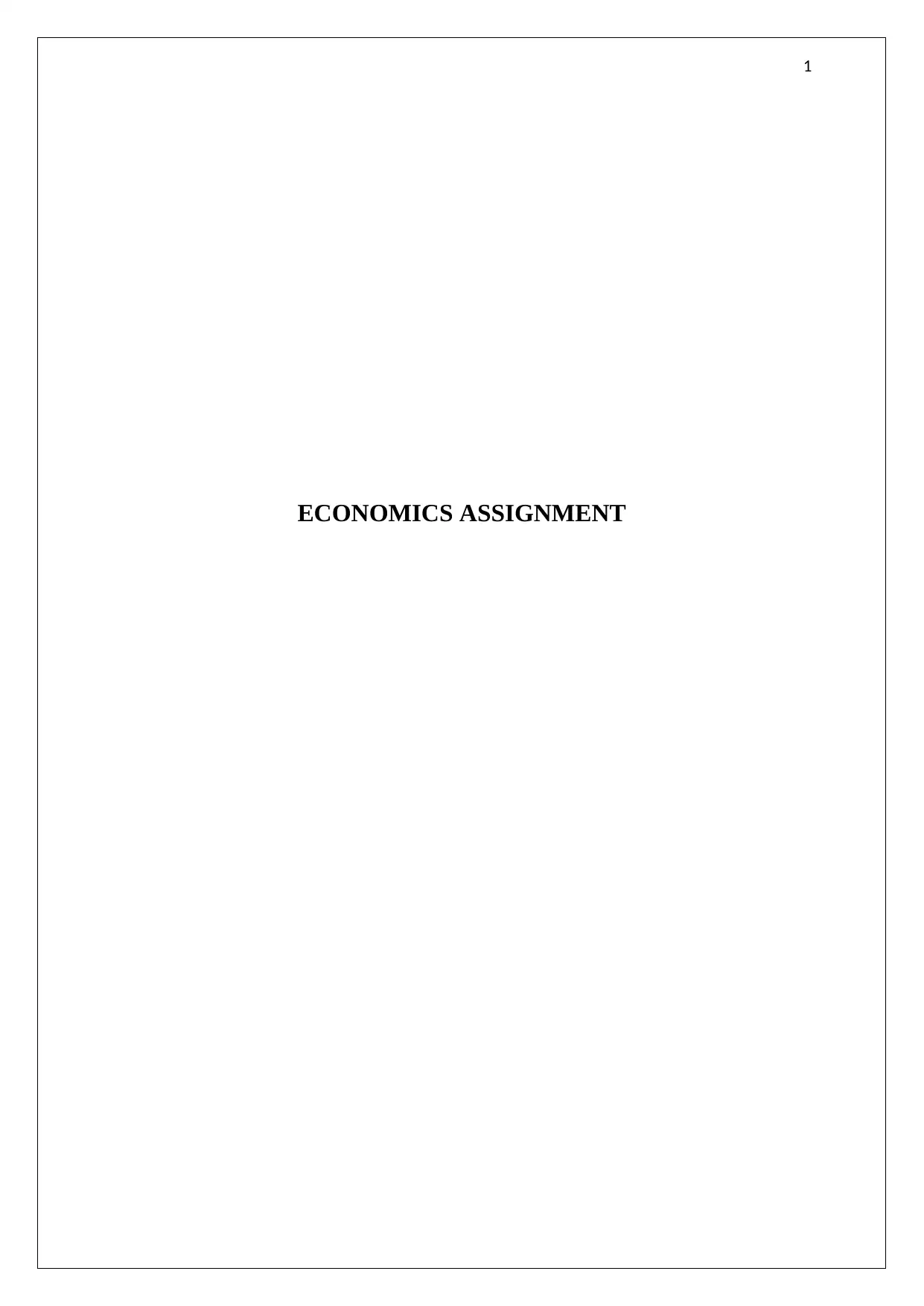
1
ECONOMICS ASSIGNMENT
ECONOMICS ASSIGNMENT
Paraphrase This Document
Need a fresh take? Get an instant paraphrase of this document with our AI Paraphraser
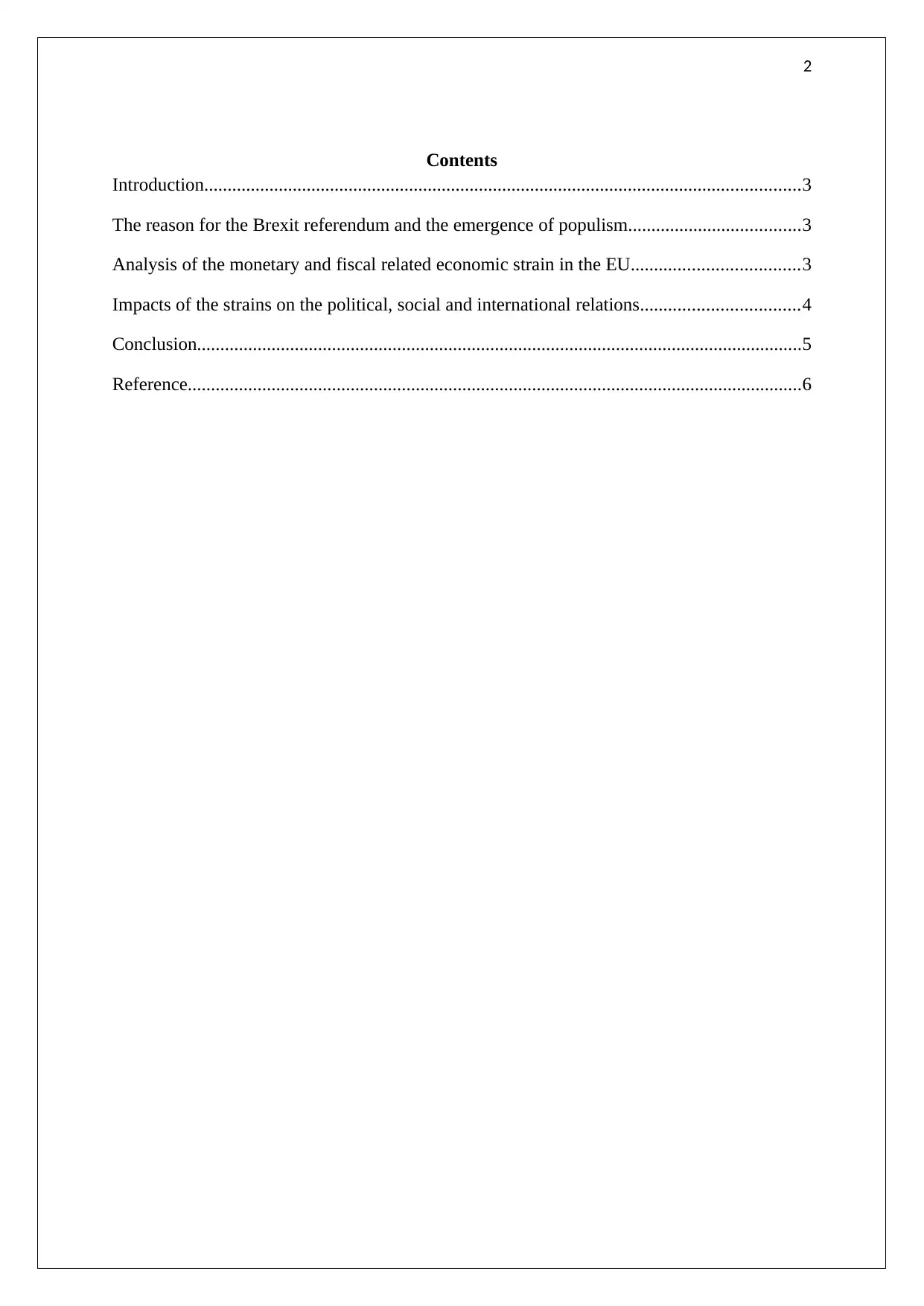
2
Contents
Introduction................................................................................................................................3
The reason for the Brexit referendum and the emergence of populism.....................................3
Analysis of the monetary and fiscal related economic strain in the EU....................................3
Impacts of the strains on the political, social and international relations..................................4
Conclusion..................................................................................................................................5
Reference....................................................................................................................................6
Contents
Introduction................................................................................................................................3
The reason for the Brexit referendum and the emergence of populism.....................................3
Analysis of the monetary and fiscal related economic strain in the EU....................................3
Impacts of the strains on the political, social and international relations..................................4
Conclusion..................................................................................................................................5
Reference....................................................................................................................................6
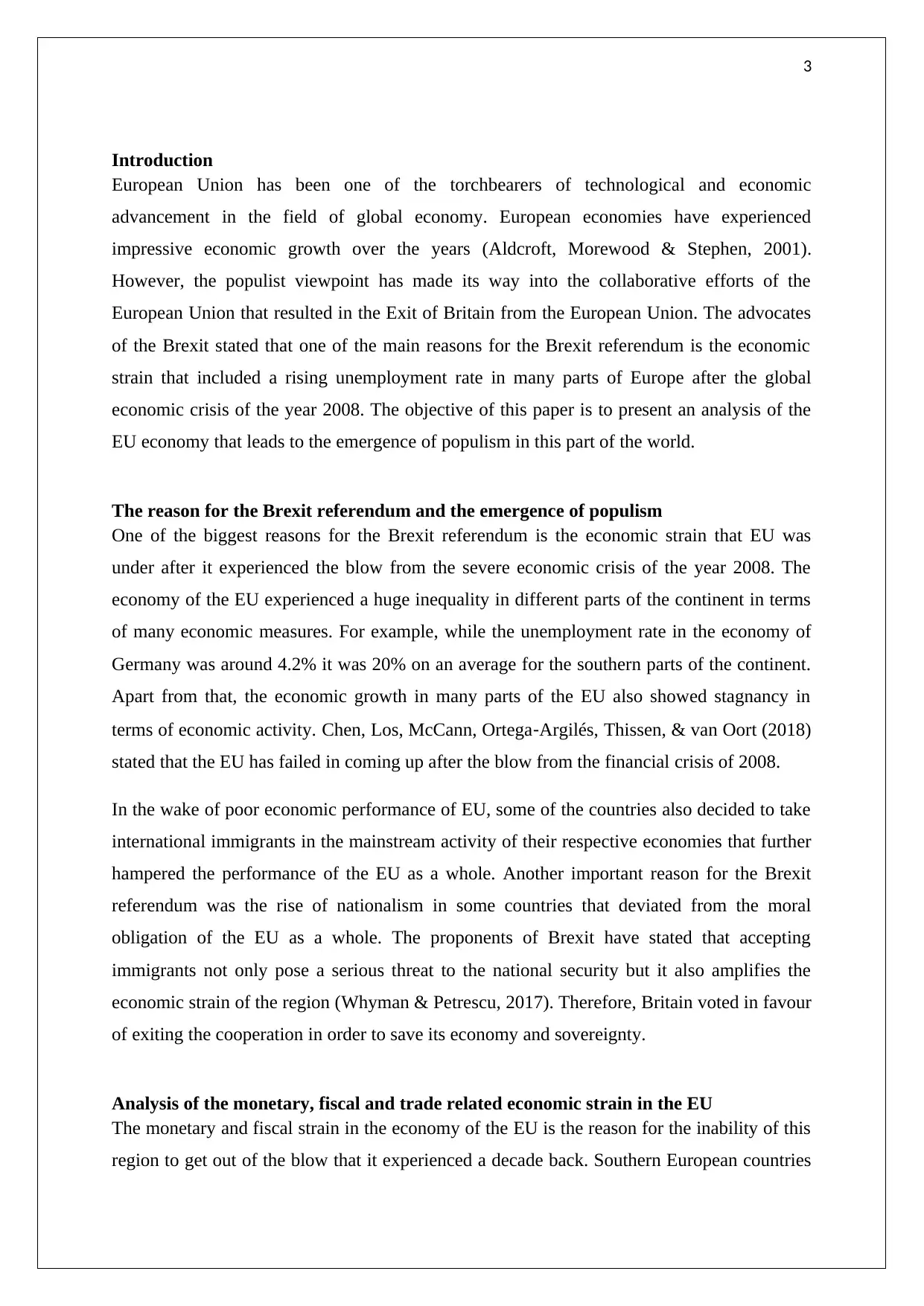
3
Introduction
European Union has been one of the torchbearers of technological and economic
advancement in the field of global economy. European economies have experienced
impressive economic growth over the years (Aldcroft, Morewood & Stephen, 2001).
However, the populist viewpoint has made its way into the collaborative efforts of the
European Union that resulted in the Exit of Britain from the European Union. The advocates
of the Brexit stated that one of the main reasons for the Brexit referendum is the economic
strain that included a rising unemployment rate in many parts of Europe after the global
economic crisis of the year 2008. The objective of this paper is to present an analysis of the
EU economy that leads to the emergence of populism in this part of the world.
The reason for the Brexit referendum and the emergence of populism
One of the biggest reasons for the Brexit referendum is the economic strain that EU was
under after it experienced the blow from the severe economic crisis of the year 2008. The
economy of the EU experienced a huge inequality in different parts of the continent in terms
of many economic measures. For example, while the unemployment rate in the economy of
Germany was around 4.2% it was 20% on an average for the southern parts of the continent.
Apart from that, the economic growth in many parts of the EU also showed stagnancy in
terms of economic activity. Chen, Los, McCann, Ortega‐Argilés, Thissen, & van Oort (2018)
stated that the EU has failed in coming up after the blow from the financial crisis of 2008.
In the wake of poor economic performance of EU, some of the countries also decided to take
international immigrants in the mainstream activity of their respective economies that further
hampered the performance of the EU as a whole. Another important reason for the Brexit
referendum was the rise of nationalism in some countries that deviated from the moral
obligation of the EU as a whole. The proponents of Brexit have stated that accepting
immigrants not only pose a serious threat to the national security but it also amplifies the
economic strain of the region (Whyman & Petrescu, 2017). Therefore, Britain voted in favour
of exiting the cooperation in order to save its economy and sovereignty.
Analysis of the monetary, fiscal and trade related economic strain in the EU
The monetary and fiscal strain in the economy of the EU is the reason for the inability of this
region to get out of the blow that it experienced a decade back. Southern European countries
Introduction
European Union has been one of the torchbearers of technological and economic
advancement in the field of global economy. European economies have experienced
impressive economic growth over the years (Aldcroft, Morewood & Stephen, 2001).
However, the populist viewpoint has made its way into the collaborative efforts of the
European Union that resulted in the Exit of Britain from the European Union. The advocates
of the Brexit stated that one of the main reasons for the Brexit referendum is the economic
strain that included a rising unemployment rate in many parts of Europe after the global
economic crisis of the year 2008. The objective of this paper is to present an analysis of the
EU economy that leads to the emergence of populism in this part of the world.
The reason for the Brexit referendum and the emergence of populism
One of the biggest reasons for the Brexit referendum is the economic strain that EU was
under after it experienced the blow from the severe economic crisis of the year 2008. The
economy of the EU experienced a huge inequality in different parts of the continent in terms
of many economic measures. For example, while the unemployment rate in the economy of
Germany was around 4.2% it was 20% on an average for the southern parts of the continent.
Apart from that, the economic growth in many parts of the EU also showed stagnancy in
terms of economic activity. Chen, Los, McCann, Ortega‐Argilés, Thissen, & van Oort (2018)
stated that the EU has failed in coming up after the blow from the financial crisis of 2008.
In the wake of poor economic performance of EU, some of the countries also decided to take
international immigrants in the mainstream activity of their respective economies that further
hampered the performance of the EU as a whole. Another important reason for the Brexit
referendum was the rise of nationalism in some countries that deviated from the moral
obligation of the EU as a whole. The proponents of Brexit have stated that accepting
immigrants not only pose a serious threat to the national security but it also amplifies the
economic strain of the region (Whyman & Petrescu, 2017). Therefore, Britain voted in favour
of exiting the cooperation in order to save its economy and sovereignty.
Analysis of the monetary, fiscal and trade related economic strain in the EU
The monetary and fiscal strain in the economy of the EU is the reason for the inability of this
region to get out of the blow that it experienced a decade back. Southern European countries
⊘ This is a preview!⊘
Do you want full access?
Subscribe today to unlock all pages.

Trusted by 1+ million students worldwide
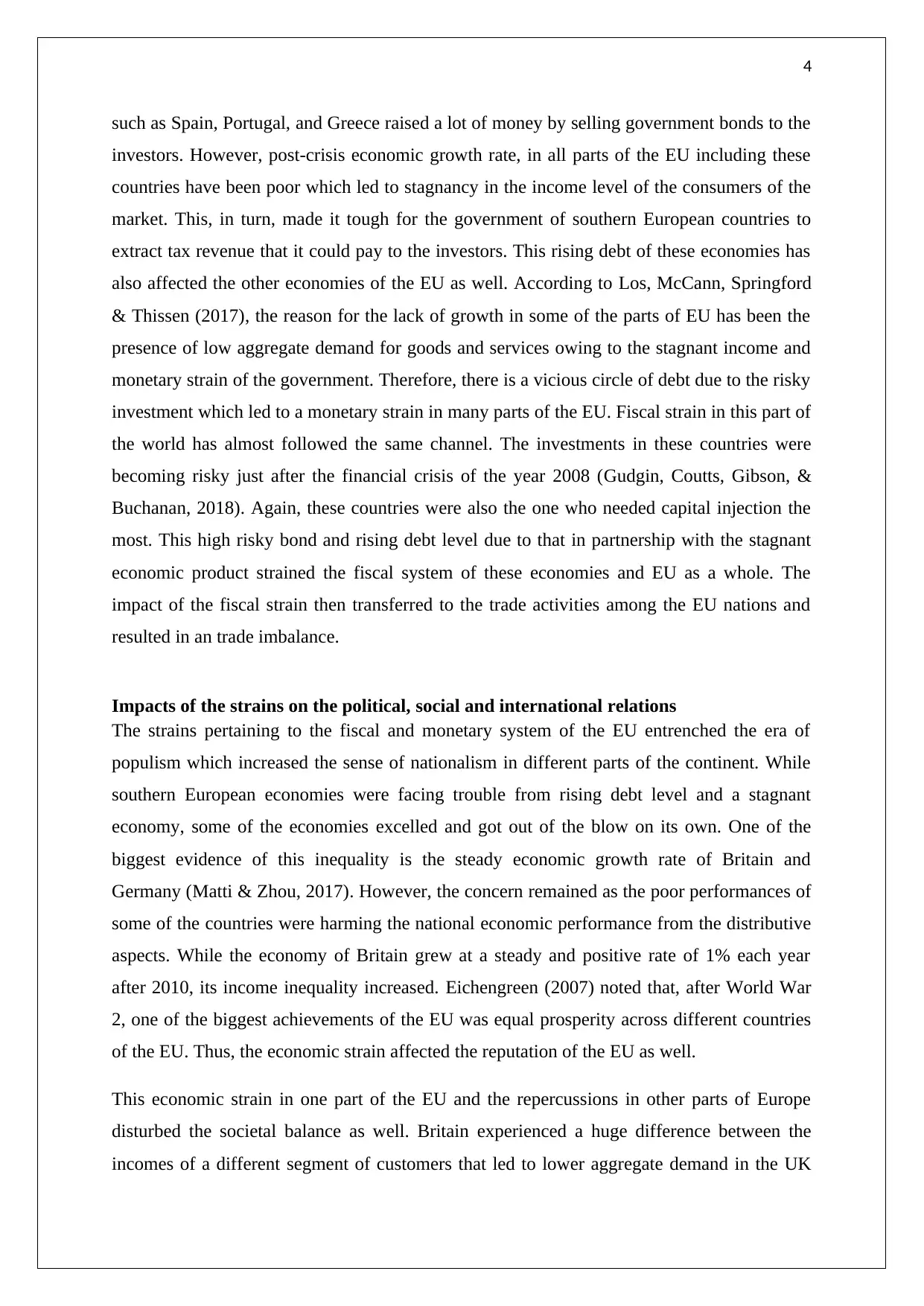
4
such as Spain, Portugal, and Greece raised a lot of money by selling government bonds to the
investors. However, post-crisis economic growth rate, in all parts of the EU including these
countries have been poor which led to stagnancy in the income level of the consumers of the
market. This, in turn, made it tough for the government of southern European countries to
extract tax revenue that it could pay to the investors. This rising debt of these economies has
also affected the other economies of the EU as well. According to Los, McCann, Springford
& Thissen (2017), the reason for the lack of growth in some of the parts of EU has been the
presence of low aggregate demand for goods and services owing to the stagnant income and
monetary strain of the government. Therefore, there is a vicious circle of debt due to the risky
investment which led to a monetary strain in many parts of the EU. Fiscal strain in this part of
the world has almost followed the same channel. The investments in these countries were
becoming risky just after the financial crisis of the year 2008 (Gudgin, Coutts, Gibson, &
Buchanan, 2018). Again, these countries were also the one who needed capital injection the
most. This high risky bond and rising debt level due to that in partnership with the stagnant
economic product strained the fiscal system of these economies and EU as a whole. The
impact of the fiscal strain then transferred to the trade activities among the EU nations and
resulted in an trade imbalance.
Impacts of the strains on the political, social and international relations
The strains pertaining to the fiscal and monetary system of the EU entrenched the era of
populism which increased the sense of nationalism in different parts of the continent. While
southern European economies were facing trouble from rising debt level and a stagnant
economy, some of the economies excelled and got out of the blow on its own. One of the
biggest evidence of this inequality is the steady economic growth rate of Britain and
Germany (Matti & Zhou, 2017). However, the concern remained as the poor performances of
some of the countries were harming the national economic performance from the distributive
aspects. While the economy of Britain grew at a steady and positive rate of 1% each year
after 2010, its income inequality increased. Eichengreen (2007) noted that, after World War
2, one of the biggest achievements of the EU was equal prosperity across different countries
of the EU. Thus, the economic strain affected the reputation of the EU as well.
This economic strain in one part of the EU and the repercussions in other parts of Europe
disturbed the societal balance as well. Britain experienced a huge difference between the
incomes of a different segment of customers that led to lower aggregate demand in the UK
such as Spain, Portugal, and Greece raised a lot of money by selling government bonds to the
investors. However, post-crisis economic growth rate, in all parts of the EU including these
countries have been poor which led to stagnancy in the income level of the consumers of the
market. This, in turn, made it tough for the government of southern European countries to
extract tax revenue that it could pay to the investors. This rising debt of these economies has
also affected the other economies of the EU as well. According to Los, McCann, Springford
& Thissen (2017), the reason for the lack of growth in some of the parts of EU has been the
presence of low aggregate demand for goods and services owing to the stagnant income and
monetary strain of the government. Therefore, there is a vicious circle of debt due to the risky
investment which led to a monetary strain in many parts of the EU. Fiscal strain in this part of
the world has almost followed the same channel. The investments in these countries were
becoming risky just after the financial crisis of the year 2008 (Gudgin, Coutts, Gibson, &
Buchanan, 2018). Again, these countries were also the one who needed capital injection the
most. This high risky bond and rising debt level due to that in partnership with the stagnant
economic product strained the fiscal system of these economies and EU as a whole. The
impact of the fiscal strain then transferred to the trade activities among the EU nations and
resulted in an trade imbalance.
Impacts of the strains on the political, social and international relations
The strains pertaining to the fiscal and monetary system of the EU entrenched the era of
populism which increased the sense of nationalism in different parts of the continent. While
southern European economies were facing trouble from rising debt level and a stagnant
economy, some of the economies excelled and got out of the blow on its own. One of the
biggest evidence of this inequality is the steady economic growth rate of Britain and
Germany (Matti & Zhou, 2017). However, the concern remained as the poor performances of
some of the countries were harming the national economic performance from the distributive
aspects. While the economy of Britain grew at a steady and positive rate of 1% each year
after 2010, its income inequality increased. Eichengreen (2007) noted that, after World War
2, one of the biggest achievements of the EU was equal prosperity across different countries
of the EU. Thus, the economic strain affected the reputation of the EU as well.
This economic strain in one part of the EU and the repercussions in other parts of Europe
disturbed the societal balance as well. Britain experienced a huge difference between the
incomes of a different segment of customers that led to lower aggregate demand in the UK
Paraphrase This Document
Need a fresh take? Get an instant paraphrase of this document with our AI Paraphraser
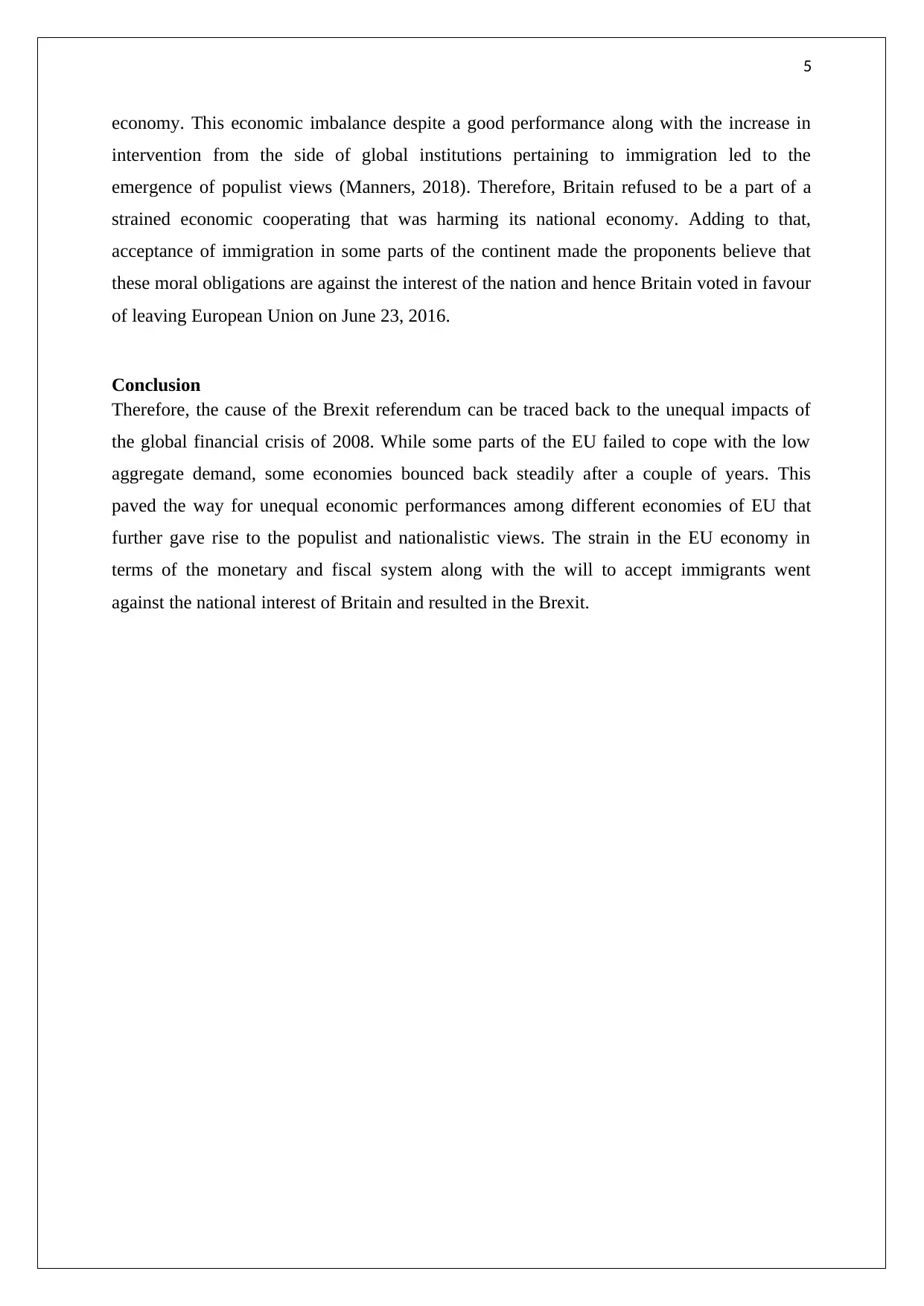
5
economy. This economic imbalance despite a good performance along with the increase in
intervention from the side of global institutions pertaining to immigration led to the
emergence of populist views (Manners, 2018). Therefore, Britain refused to be a part of a
strained economic cooperating that was harming its national economy. Adding to that,
acceptance of immigration in some parts of the continent made the proponents believe that
these moral obligations are against the interest of the nation and hence Britain voted in favour
of leaving European Union on June 23, 2016.
Conclusion
Therefore, the cause of the Brexit referendum can be traced back to the unequal impacts of
the global financial crisis of 2008. While some parts of the EU failed to cope with the low
aggregate demand, some economies bounced back steadily after a couple of years. This
paved the way for unequal economic performances among different economies of EU that
further gave rise to the populist and nationalistic views. The strain in the EU economy in
terms of the monetary and fiscal system along with the will to accept immigrants went
against the national interest of Britain and resulted in the Brexit.
economy. This economic imbalance despite a good performance along with the increase in
intervention from the side of global institutions pertaining to immigration led to the
emergence of populist views (Manners, 2018). Therefore, Britain refused to be a part of a
strained economic cooperating that was harming its national economy. Adding to that,
acceptance of immigration in some parts of the continent made the proponents believe that
these moral obligations are against the interest of the nation and hence Britain voted in favour
of leaving European Union on June 23, 2016.
Conclusion
Therefore, the cause of the Brexit referendum can be traced back to the unequal impacts of
the global financial crisis of 2008. While some parts of the EU failed to cope with the low
aggregate demand, some economies bounced back steadily after a couple of years. This
paved the way for unequal economic performances among different economies of EU that
further gave rise to the populist and nationalistic views. The strain in the EU economy in
terms of the monetary and fiscal system along with the will to accept immigrants went
against the national interest of Britain and resulted in the Brexit.
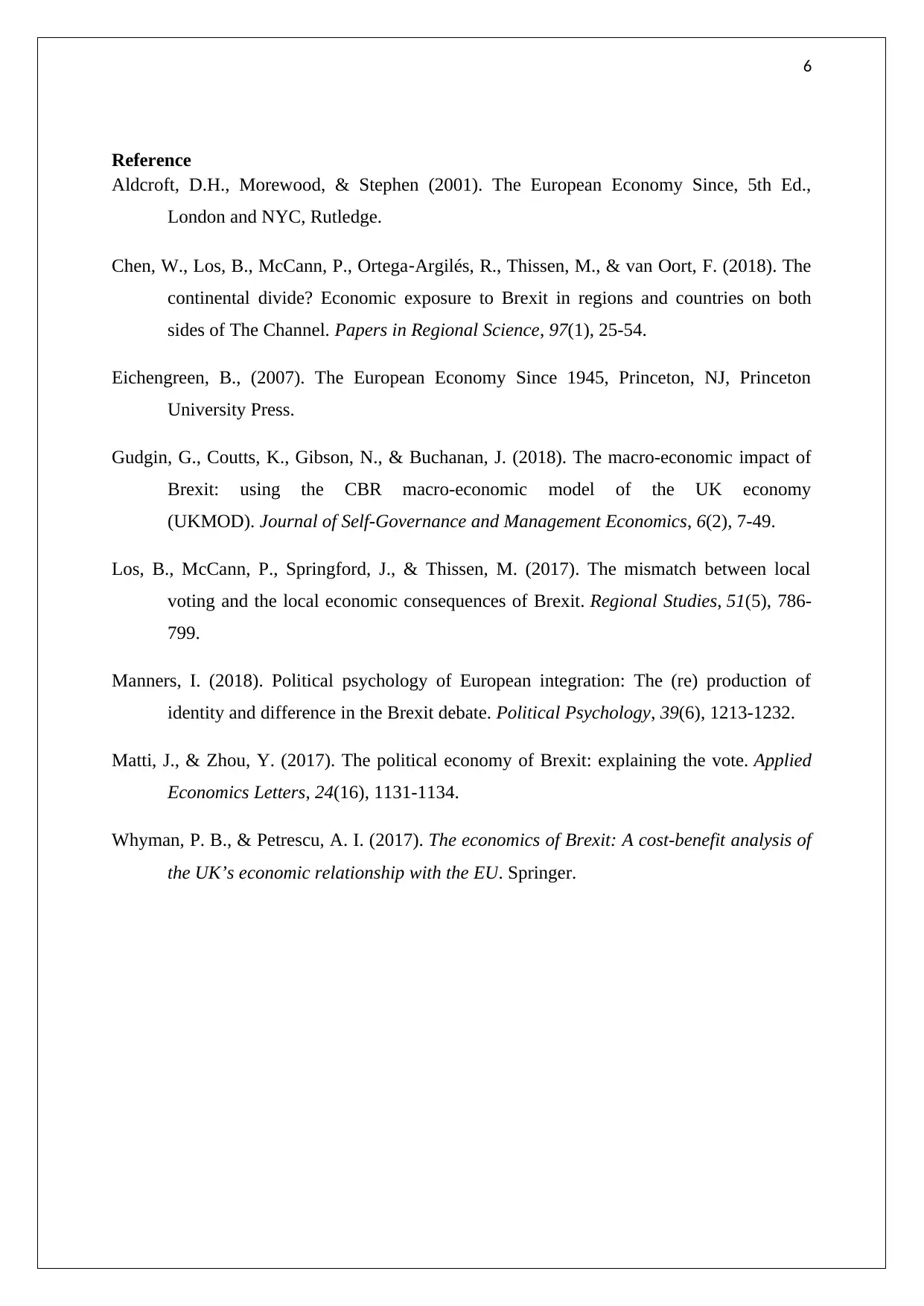
6
Reference
Aldcroft, D.H., Morewood, & Stephen (2001). The European Economy Since, 5th Ed.,
London and NYC, Rutledge.
Chen, W., Los, B., McCann, P., Ortega‐Argilés, R., Thissen, M., & van Oort, F. (2018). The
continental divide? Economic exposure to Brexit in regions and countries on both
sides of The Channel. Papers in Regional Science, 97(1), 25-54.
Eichengreen, B., (2007). The European Economy Since 1945, Princeton, NJ, Princeton
University Press.
Gudgin, G., Coutts, K., Gibson, N., & Buchanan, J. (2018). The macro-economic impact of
Brexit: using the CBR macro-economic model of the UK economy
(UKMOD). Journal of Self-Governance and Management Economics, 6(2), 7-49.
Los, B., McCann, P., Springford, J., & Thissen, M. (2017). The mismatch between local
voting and the local economic consequences of Brexit. Regional Studies, 51(5), 786-
799.
Manners, I. (2018). Political psychology of European integration: The (re) production of
identity and difference in the Brexit debate. Political Psychology, 39(6), 1213-1232.
Matti, J., & Zhou, Y. (2017). The political economy of Brexit: explaining the vote. Applied
Economics Letters, 24(16), 1131-1134.
Whyman, P. B., & Petrescu, A. I. (2017). The economics of Brexit: A cost-benefit analysis of
the UK’s economic relationship with the EU. Springer.
Reference
Aldcroft, D.H., Morewood, & Stephen (2001). The European Economy Since, 5th Ed.,
London and NYC, Rutledge.
Chen, W., Los, B., McCann, P., Ortega‐Argilés, R., Thissen, M., & van Oort, F. (2018). The
continental divide? Economic exposure to Brexit in regions and countries on both
sides of The Channel. Papers in Regional Science, 97(1), 25-54.
Eichengreen, B., (2007). The European Economy Since 1945, Princeton, NJ, Princeton
University Press.
Gudgin, G., Coutts, K., Gibson, N., & Buchanan, J. (2018). The macro-economic impact of
Brexit: using the CBR macro-economic model of the UK economy
(UKMOD). Journal of Self-Governance and Management Economics, 6(2), 7-49.
Los, B., McCann, P., Springford, J., & Thissen, M. (2017). The mismatch between local
voting and the local economic consequences of Brexit. Regional Studies, 51(5), 786-
799.
Manners, I. (2018). Political psychology of European integration: The (re) production of
identity and difference in the Brexit debate. Political Psychology, 39(6), 1213-1232.
Matti, J., & Zhou, Y. (2017). The political economy of Brexit: explaining the vote. Applied
Economics Letters, 24(16), 1131-1134.
Whyman, P. B., & Petrescu, A. I. (2017). The economics of Brexit: A cost-benefit analysis of
the UK’s economic relationship with the EU. Springer.
⊘ This is a preview!⊘
Do you want full access?
Subscribe today to unlock all pages.

Trusted by 1+ million students worldwide
1 out of 6
Related Documents
Your All-in-One AI-Powered Toolkit for Academic Success.
+13062052269
info@desklib.com
Available 24*7 on WhatsApp / Email
![[object Object]](/_next/static/media/star-bottom.7253800d.svg)
Unlock your academic potential
Copyright © 2020–2026 A2Z Services. All Rights Reserved. Developed and managed by ZUCOL.





